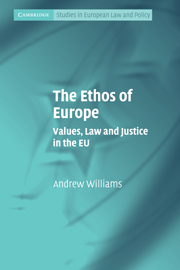6 - Liberty
Published online by Cambridge University Press: 05 June 2012
Summary
Introduction
An abundance of ambition attaches to the EU when it comes to values. We have already seen in the previous chapters the adoption of a constitutional language that claims the institution is integrally bound by some of the grandest principles of Western political philosophy. And modesty has never been a quality the EU institutions have evaded in this respect. They seem to embrace an almost messianic narrative when it comes to projecting ‘values’ to the EU's constituents and to the world. The Union is presented as not only the guardian of these values internally but also the beacon for all other societies, a model for other regional ventures to follow.
Liberty (or freedom, we need not distinguish between the two) is undoubtedly one of these fundamental values. The term has been ever present within its constituting texts. In the preamble to the EEC Treaty the signatories declared their resolve to ‘preserve and strengthen’ freedom. Much later, with the end of the Cold War, liberty was proclaimed as the first of the EU's ‘founding principles’. Now somewhat down the pecking order, relegated behind ‘human dignity’ in the Lisbon Treaty's list of values, liberty, nonetheless, has assumed an ever-present quality in institutional rhetoric. But, of course, the fact that constitutional-type statements have been adopted does not mean that there is clarity about the concept. What does it mean for the EU? And how is it reflected in practical action?
At the outset, we have something of a dual definitional problem here.
- Type
- Chapter
- Information
- The Ethos of EuropeValues, Law and Justice in the EU, pp. 197 - 241Publisher: Cambridge University PressPrint publication year: 2010



